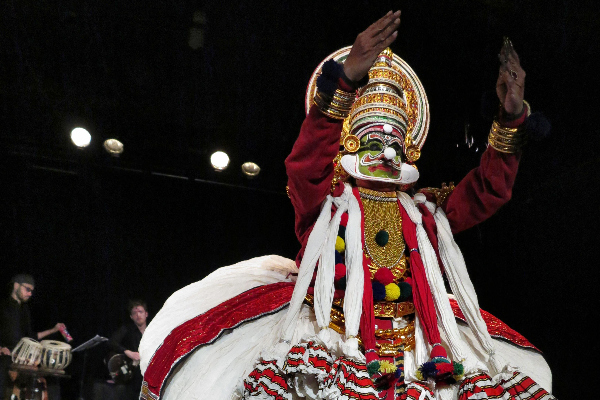Pharaoh
By Misha Shulman; Directed by Michael Posnick
Off Off Broadway, Play with Dance
Runs through 3.31.24
Theater for the New City, 155 First Avenue
by Ed Malin on 3.18.24
 Dr. Kalamandalam John in Pharaoh. Behind: Tripp Dudley and Galen Passen. Photo by Jonathan Slaff.
Dr. Kalamandalam John in Pharaoh. Behind: Tripp Dudley and Galen Passen. Photo by Jonathan Slaff.
BOTTOM LINE: Classical Indian Kathakali dancing collides with the Biblical story of Moses and Pharaoh in this unique theater event.
Playwright Misha Shulman returns to Theater for the New City with his colorful show Pharaoh, which was scheduled to premiere during the COVID-19 pandemic. I hope you will take advantage of this new opportunity to see the work, which, as Shulman’s capstone project for ordination as a Rabbi, covers a lot of ground in several spiritual traditions. As Shulman himself narrates the Biblical story of Moses, Pharaoh and the Exodus from Egypt, accompanied by Galen Passen on sitar and Tripp Dudley on tabla, master South Indian Kathakali dancer Dr. Kalamandalam John takes center stage. Larger than life and traditionally attired with exquisite colors (much credit to Kalatharangini Mary John for costumes and makeup), John embodies all of the characters in the story that Shulman tells. For the beauty and emotional range of this wordless dance performance, I am tempted to make comparisons to Japanese Kabuki theater.
Director Michael Posnick brings his experience with Pilobolus and other physical and musical theater groups to create the superb tension this story needs. The Pharaoh of this story is modeled on Ravana, the similarly all-powerful villain of the often dramatized Ramayana epic. We see mimetic representation of the ten plagues, laughing hyenas, paroxysms of sorrow, and snapping crocodiles. The pathos of a dying horse parallels Pharaoh’s realization that he is no god, but an ordinary mortal. Pharaoh’s wife, priest, and son all beg him to let the Hebrews go; he kills some supplicants and ignores others.
Finally, Pharaoh meets Moses and asks—as racial supremacists have through the ages—why anyone would want to upset the social order that benefits the rulers. Those who have studied the Exodus story (including those, like myself, who read a portion of it in synagogue for a Bar Mitzvah) have long asked why Pharaoh “hardened his heart” to the pleas of the Hebrews. Shulman’s excellent writing in this play culminates in Pharaoh’s retort to Moses: “All I enslave are your bodies. You want to enslave minds, hearts.”
What do we think about a steadfast belief in one god? Is the legacy of the Exodus story a Jewish sense of victimhood? Although many revere Moses, the humble leader with a speech impediment, can his prophecy be questioned? The people who lived in Canaan, as well as the new people who moved to Palestine more recently—aren’t they, whatever the faults of their leadership, to be regarded as people? With this fine production, you can get up close and personal with the vulnerable moments of the rich and famous. Indeed, this is a year when many in the world are not sure what is right and what is wrong. Pharaoh suggests that if we all could feel more vulnerable, we might see better paths forward.
(Pharaoh plays at Theater for the New City, 155 First Avenue, through March 31, 2024. The running time is 75 minutes, no intermission. Performances are Thursdays through Saturdays at 8 (no performance Fri 3/22) and Sundays at 3. Tickets are $18, $10 for students and seniors. For tickets and more information, call 212-254-1109 or visit theaterforthenewcity.net.)
Pharaoh is by Misha Shulman. Directed by Michael Posnick. Lighting Design by Wheeler Moon. Costume and Makeup Design by Dr. Kalatharangini Mary John. Production Coordinator is Susan Meyers. Stage Manager and Assistant Director is Alysia Homminga.
The cast is Misha Shulman and Dr. Kalamandalam John. Music performed by Galen Passen and Tripp Dudley.

